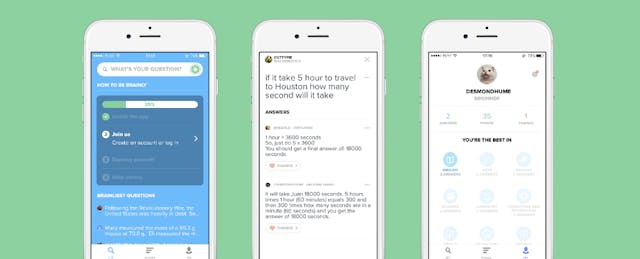Education systems and cultures may differ across the world, but nearly every student has to do homework. Many are going online for help. With more than 60 million users across 35 countries, Brainly knows this well.
The Polish startup, based in Kraków, has raised $15 million in a Series B round led by Naspers, a South African media group founded in 1915 that that is the biggest (and somewhat controversial) company in Africa. Naspers also actively invests in startups around the world, and established a venture office in San Francisco this month. Brainly is the the firm’s first education technology investment.
Brainly’s previous investors, General Catalyst Partners and Learn Capital, along with Berlin-based Point Nine Capital, also contributed to this round. This deal boosts the company’s funding total to $27 million.
Brainly was started in 2009 by a trio of university students as an online community where students can get homework help from their peers. The product works like Quora or Yahoo Answers; students post questions and get answers. Within a year the tool reached a million users in Poland, and the startup soon expanded to Russia and Turkey. In spring 2014, Brainly opened a New York office that now houses 10 employees. (Expect that number to double by the end of the year with the addition of engineering, product and marketing staff.)
This is the third fundraise for the company, even though it does not make any money. Michal Borkowski, the company’s CEO, suggests future monetization plans may involve offering tutoring and university enrollment services—“market opportunities that are obvious revenue sources,” in his words. But right now, “Brainly is about growth right now and our main focus is on making sure that we reach all students globally,” he tells EdSurge.

Brainly boasted in the funding announcement that 8,000 questions are answered every hour—a claim worth testing. Within a minute of posting the question above, I got two answers. The platform includes a rating system that awards point to users for answering questions, and each response can be flagged and reported if they are inappropriate. There are roughly 1,000 moderators who monitor and ensure the quality of answers.
The company has found that it needs to monitor questions as well. There’s a fine line between homework help and outright cheating—and this has become a concern for Borkowski. “We always treat cheating seriously,” he states, although feedback from teachers suggests they are more concerned with students finding accurate content rather than cheating.
Moderators are responsible for flagging suspicious multiple-choice questions. But a quick glance at the homepage’s main feed suggests they have their work cut out. It’s common to see users simply copying and pasting questions directly from their assignments or tests, seeking answers but not explanations.

Quality control will be key as Brainly attempts to shed its image as a destination for quick, free answers. “When we look at the company vision, it’s about giving access to personalized learning to every student in the world,” Borkowski states. Instead of “homework help,” he prefers to describe Brainly as a “social learning platform.” He’d like to see more meaningful discussion and dialogue, instead of questions and answers. Users shouldn’t go to Brainly for quick answers, but to “explore new questions and topics on a deeper level.”
The proliferation of search engines and services like Brainly has raised questions over whether homework is necessary—or even useful—in the digital age. After all, what is the point of asking questions about specific facts when all the answers can be found online?
Borkowski believes there’s still value in homework. “There are certain skills that should be practiced to make sure you understand them very well,” he says. The company sent a survey to its users this spring, and learned more than 60 percent of respondents do not have access to help from family members or tutoring services. Connecting these learners with peer support remains a core part of the company’s mission.
But Brainly’s future, Borkowski says, isn’t just about giving kids information. “We want to encourage students to discover new topics, connect, and develop new ideas of their own.”


